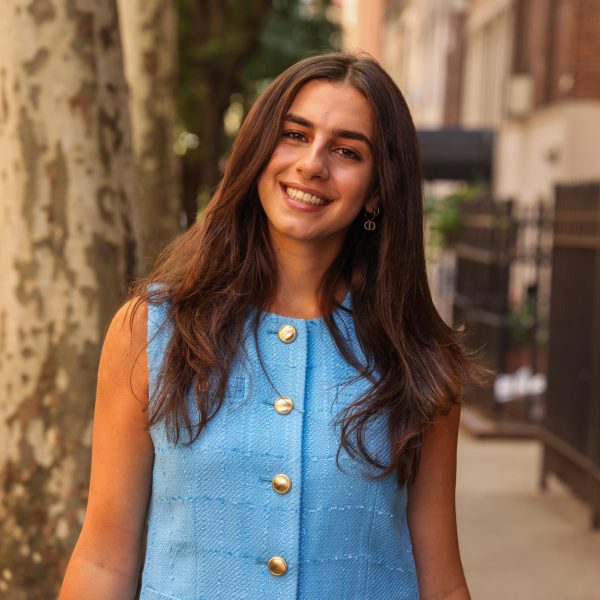Beyond NYU: Concocting creativity with cabaret
Salty Brine discovered his passion for storytelling while studying at NYU. Now, he creates and performs his own cabaret shows in New York City.
(Illustration by Aaliya Luthra)
April 8, 2023
Tisch alum Salty Brine takes audiences on a musical, comical and historical journey in his drag cabaret shows. Brine grew up in the suburbs of Massachusetts and North Carolina, and first tried dressing in drag in public at NYU — a place he felt safe doing drag in a way that he had not during his childhood. He found a love for storytelling in college that eventually led him to create and perform “The Living Record Collection” — a cabaret show centered on pop music, which has been called “highly addictive” and “the closest thing you’ll get to an M. Night Shyamalan-level twist in cabaret” by reviewers.
In addition to his work in cabaret theater — a genre that combines elements of concerts and musicals — Brine has worked with influential musical figures such as eight time Academy award winner Alan Menken and Tony award winner Justin Levine.
Brine attended NYU’s Tisch School of the Arts to study at its Playwrights Horizons Theater School, which he graduated from in 2003. After college, he stayed at NYU, becoming a teaching assistant in acting and dancing classes. He eventually began teaching his own classes at the university that focused on skills like acting while singing, and discussed how students can use their life experiences as tools to tell stories.
In an interview with WSN, Brine spoke about how his time at NYU taught him to write and perform, his journey to performing the “Living Record Collection,” and what he hopes audiences take from his cabaret shows.
This interview has been edited for length and clarity.
WSN: How would you describe your performances to someone who has never been to a cabaret show?
Brine: My shows are full musicals, rock concerts, stand-up comedy, a drag show, a history lesson and more, all wrapped in this form which I call cabaret. So I am taking all of that stuff and pushing it through this filter of band, microphone and no fourth wall — I’m talking directly to the audience. Then I stuff my shows with an abundance of ideas. In each show I am using one album, but I often incorporate music from all over the place and sew it in. Sometimes I’ll have people come up to me after the show and they’ll say, “I tried to explain your show to my friends to get them to come, and I don’t ever know what to say.” I always say, “You have to trust me — just come and you will see.” I love that, and it feels like a compliment to me that my show is tricky to pin down.
WSN: How did your childhood and college experience influence your work today?
Brine: I was a really precocious kid. I used to go to my parents’ cocktail parties with a Shirley Temple in my hand and work the room. In a way, my shows are just still me at 7 or 8 years old, doing that very thing — in my patent leather shoes that I was so excited to put on everytime we had a party. I learned at NYU to use all of the things that make me who I am in my art, as opposed to trying to figure out what other people think I should be, or what other people would like to see in terms of art.
In addition to performing arts classes, Brine had the opportunity to take a variety of liberal arts courses at NYU that deeply impacted him. He took a class at the Gallatin School of Individualized Study titled “Gender Identity in Social Space” that he said helped him understand how human beings perceive sexuality in public spaces like the subway or the street. After graduating from NYU, Brine began hosting a drag karaoke show at a dive bar in Astoria, Queens, a gig he said felt like a culmination of his work.
WSN: What drives you in your theater and performance career?
Brine: I had always seen my work in theater, especially when studying at NYU, as so vital to society — this idea that storytelling can change the world in small ways and can change a person’s day from a bad one to a good one. That work felt really important and the romps around the village in high heels felt frivolous to me — it was fun, but silly. When I started hosting this karaoke show, which is just a bit of silliness, I started to see that all the training of the theater I had and all the silly frivolous things of the drag actually were the same thing.
I realized that reaching people and making them feel, think and change could be best done with a lot of glitter, huge eyelashes and very high heels. There was something about the combination of those two things. The highbrow and lowbrow coming together, and making people laugh and then making them think was a magic combination for me.
During an anniversary celebration for the bar in Queens, Brine was asked to perform a 15-minute theater piece with a guitarist, which he said was the first experience he had where he realized that what he had to give as a performer could leave a lasting impact on his audiences. Brine began to take stand-up comedy jobs on shows that were looking for a variety act, which helped him learn to write material for himself. While he was being featured in other people’s shows, he began to want his own. Eventually, he created a 90-minute production with a partner and performed it at a rented-out burlesque house on the Lower East Side.
WSN: Can you describe the first show you performed at the burlesque house?
Brine: There was a junky piano that was so out of tune, and we got up there, and I sang and told stories for 90 minutes. It went fine and the audience loved it, but I knew I could do better, and I was hard on myself. It was hard to bring the idea that I had in my head of what I wanted to make and the thing I was capable of making because I was young and new.
I always, at that time, told myself that what I wanted to be was a cult celebrity cabaret star, meaning I had a small but devoted following of fans who would come out and see what I did, and it felt almost special that you know it exists. That’s the feeling I had about some of my favorite performers, was like, “I can’t believe this thing exists. I know about it, and I get to go stand here and experience it.” I loved that feeling, and I wanted to give that feeling to other people.
Brine says that creating a cabaret show involves researching and reading before starting the writing process. After doing some research, he goes through a period of writing drafts, during which he receives notes from his team and makes changes accordingly. Finally, he performs the show in front of a small, invited audience so he can see how the story and jokes play out.
WSN: How does it feel when you are performing on stage?
Brine: The first performance of a show, where I am completely off-book and I go out in front of the audience for the first time, is very scary. It’s really fun, the adrenaline is very intense, and my body keeps me going, but I always feel a little bit like the show is running away from me and I am chasing after it the whole time — there is no avoiding that the first night. After I’ve run it a couple of times, I start to calm down and then I can have more fun playing inside of it.
Currently, Brine performs his shows at Joe’s Pub in lower Manhattan. As he continues his career, he wants to learn more about storytelling and better understand the relationship between audiences and performers.While Brine hopes to continue working in New York, he eventually wants to perform his shows for crowds around the world.
Contact Adrianna Nehme at [email protected].

























































































































































